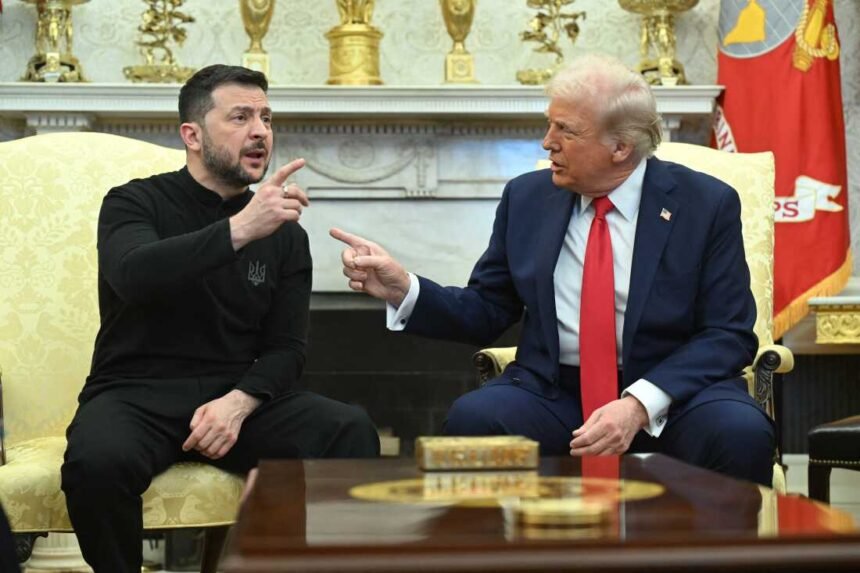In a dramatic and contentious meeting at the White House on February 28, 2025, U.S. President Donald Trump and Ukrainian President Volodymyr Zelenskyy engaged in a heated exchange that has sparked international backlash and raised serious concerns about America’s commitment to supporting democratically elected allies. The confrontation, widely criticized as an embarrassing diplomatic failure, threatens to undermine U.S. credibility on the global stage and diminish its reputation as a defender of democracy.
The meeting, initially intended to finalize a mineral resources agreement and discuss pathways to ceasefire in the ongoing Russo-Ukrainian conflict, quickly devolved into hostility. President Trump accused Zelenskyy of “gambling with World War Three” and suggested that U.S. military aid could be withdrawn if Ukraine did not pursue negotiations with Russia on his terms. The remarks were seen as a stark departure from the long-standing U.S. policy of unwavering support for Ukraine’s sovereignty and territorial integrity.
Tensions escalated further when President Zelenskyy proposed that Vice President JD Vance visit Ukraine to witness firsthand the devastation caused by the Russian invasion. The suggestion was met with resistance from the U.S. delegation, leading to a heated argument. Trump went on to criticize Zelenskyy for not being “ready for peace” and hinted that the U.S. might reconsider its commitments to Kyiv if the Ukrainian government did not align with his administration’s views.
The abrupt and hostile nature of the exchange resulted in the cancellation of a planned joint press conference and the signing ceremony for the mineral agreement, fueling further speculation about the state of U.S.-Ukraine relations. Global leaders, including European Union officials and NATO allies, have expressed concerns over Trump’s stance, warning that such rhetoric weakens international unity against Russian aggression and emboldens authoritarian regimes.
This incident carries severe implications for the United States’ global standing. By publicly chastising a democratically elected leader who is actively defending his nation against foreign aggression, the U.S. sends a troubling message of inconsistency and retreat from its historical role as a beacon of democracy. The move not only damages relations with Ukraine but also risks alienating allies who have long relied on American leadership to uphold democratic values and deter authoritarian threats.
The perception of the U.S. stepping back from its support for Ukraine may have ripple effects beyond Eastern Europe. Pro-democracy movements worldwide could feel discouraged, while authoritarian leaders, including Russia’s Vladimir Putin and China’s Xi Jinping, might see this as an opportunity to expand their influence unchecked.
Domestically, the backlash has been swift. Senate Democratic Leader Chuck Schumer condemned Trump’s approach, stating that it “undermines the United States’ credibility and sends a dangerous signal to dictators around the world.” Even some Republican lawmakers have privately expressed concern that the administration’s handling of Ukraine could erode bipartisan support for maintaining a strong U.S. presence in global democracy initiatives.
The fallout from this confrontation is expected to shape U.S. foreign policy moving forward. If allies perceive the United States as unreliable or willing to sacrifice democratic principles for political expediency, its global influence could rapidly decline. With China and Russia eager to fill the vacuum left by wavering U.S. commitments, this latest diplomatic misstep may mark a significant shift in international power dynamics—one that the United States may struggle to recover from in the years ahead.







